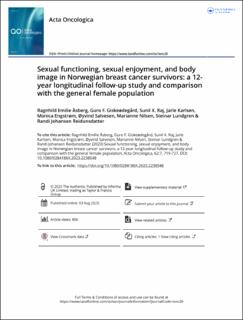| dc.contributor.author | Åsberg, Ragnhild Emilie | |
| dc.contributor.author | Giskeødegård, Guro F. | |
| dc.contributor.author | Raj, Sunil Xavier | |
| dc.contributor.author | Karlsen, Jarle | |
| dc.contributor.author | Engstrøm, Monica Jernberg | |
| dc.contributor.author | Salvesen, Øyvind Olav | |
| dc.contributor.author | Nilsen, Marianne | |
| dc.contributor.author | Lundgren, Steinar | |
| dc.contributor.author | Reidunsdatter, Randi Johansen | |
| dc.date.accessioned | 2023-12-06T06:48:49Z | |
| dc.date.available | 2023-12-06T06:48:49Z | |
| dc.date.created | 2023-08-22T13:31:44Z | |
| dc.date.issued | 2023 | |
| dc.identifier.issn | 0284-186X | |
| dc.identifier.uri | https://hdl.handle.net/11250/3106122 | |
| dc.description.abstract | Background
Given the scarcity of evidence concerning the long-term sexual health of breast cancer (BC) survivors (BC-Pop), we aimed to assess how BC treatments affect short- and long-term sexual functioning, sexual enjoyment, and body image, and compare with aged-matched women in the Norwegian general population (F-GenPop).
Material and Methods
The 349 patients in BC-Pop treated at Trondheim University Hospital in 2007–2014, were assessed in clinical controls at the hospital; before starting radiotherapy (T1, baseline), immediately after ending radiotherapy (T2), and after 3, 6, and 12 months (T3–T5), and at a long-term follow-up 7–12 years after baseline (T6). Meanwhile, F-GenPop included 2254 age-matched women in the Norwegian general population. The impact of BC treatment on sexual functioning was examined using a Linear Mixed Model. Sexual functioning, sexual enjoyment, and body image were assessed with the EORTC′s QLQ-BR23 scales and compared between the populations in the four age groups (30–49, 50–59, 60–69, and 70+ years) using means with 95% confidence intervals and Student t-test. Linear regression, adjusted for age and comorbidity was applied to estimate individual scores.
Result
BC survivors treated with mastectomy had overall lower sexual functioning than patients who had received breast-conserving surgery (p = 0.017). Although BC survivors treated with chemotherapy had lower sexual functioning than those treated without chemotherapy at T1–T5 (p = 0.044), both groups showed the same level of functioning at T6. BC-Pop exhibited significantly poorer sexual functioning (p < 0.001), lower sexual enjoyment (p < 0.05), and better body image (p < 0.001) than F-GenPop in all age groups.
Conclusion
The impact of specific BC treatments on sexual functioning was modest; only mastectomy had a persistent negative influence. Nevertheless, all age groups in BC-Pop displayed significantly poorer sexual functioning than F-GenPop at both 12 months and up to 12 years after treatment. | en_US |
| dc.language.iso | eng | en_US |
| dc.publisher | Informa UK Limited | en_US |
| dc.rights | Navngivelse 4.0 Internasjonal | * |
| dc.rights.uri | http://creativecommons.org/licenses/by/4.0/deed.no | * |
| dc.title | Sexual functioning, sexual enjoyment, and body image in Norwegian breast cancer survivors: a 12-year longitudinal follow-up study and comparison with the general female population | en_US |
| dc.title.alternative | Sexual functioning, sexual enjoyment, and body image in Norwegian breast cancer survivors: a 12-year longitudinal follow-up study and comparison with the general female population | en_US |
| dc.type | Peer reviewed | en_US |
| dc.type | Journal article | en_US |
| dc.description.version | publishedVersion | en_US |
| dc.source.volume | 62 | en_US |
| dc.source.journal | Acta Oncologica | en_US |
| dc.source.issue | 7 | en_US |
| dc.identifier.doi | 10.1080/0284186X.2023.2238548 | |
| dc.identifier.cristin | 2168756 | |
| cristin.ispublished | true | |
| cristin.fulltext | original | |
| cristin.qualitycode | 1 | |

